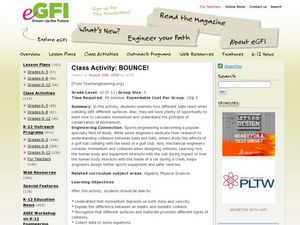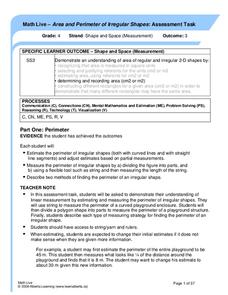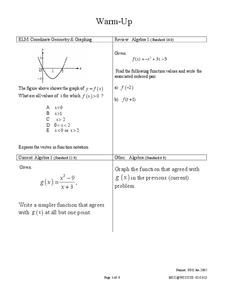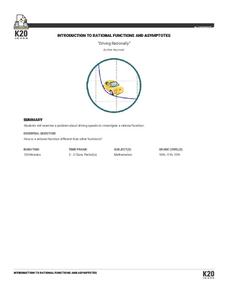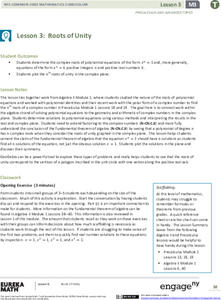Curated OER
Algebra 1: Slope as Rate
Students solve problems with slopes. In this algebra lesson, students identify the slope of a line and relate it to the rate of change. They graph their lines on the TI and observe changes in the lines.
EngageNY
The Binomial Theorem
Sometimes, there is a better way. Scholars develop Pascal's triangle as a method to arrive at the coefficients of binomial expansions as an easier method to expand binomials. The learners connect the formula for binomial coefficients to...
NASA
Exploring Exoplanets with Kepler
Calculate the movement and properties of planets like professional astronomers! Scholars use Kepler's third law to find Mercury and Venus's distance from the sun. Using changes in brightness of distant stars and Kepler's third law,...
Texas Instraments
Getting Started Dilemma
Get out those thinking caps and apply graphing functions to a real-world problem. Use the TI-83 graphing calculator to evaluate algebraic expressions that are imbedded in a series of real-world scenarios. A great lesson!
Curated OER
Class Activity: BOUNCE!
Kinematic equations are used to calculate the velocity and momentum of different types of balls bounced on different surfaces. The lesson plan is detailed and provides a materials list, background information, and procedures....
EngageNY
Volume and Cavalieri’s Principle
Take a slice out of life. The ninth section in a series of 23 introduces classmates to Cavalieri's principle using cross sections of a cone and stacks of coins. Class members participate in a discussion using pyramids and how Cavalieri's...
Alberta Learning
Area and Perimeter of Irregular Shapes
Evaluate young mathematicians' understanding of area and perimeter with this series of three assessment tasks. Challenging students to not only calculate the area and perimeter of irregular shapes, but to explain in writing their...
California Department of Education
Slap Tubes, Flutes, and Xylophones: The Physics of Pipe-Based Instruments
It's the encore to a wave unit. Individuals build either a slap tube, flute, or xylophone as a culminating activity for a physics unit on waves. Scholars calculate the lengths of pipes needed to produce the specific notes for their...
EngageNY
Equations of Graphs of Proportional Relationships Involving Fractions
The 15th segment in a series of 22 uses examples that present proportional relationships with fractions. Pupils work through the problems and discover that the process is the same as it is with whole number values. Graphing the...
Florida International University
Counting FishStix
How do we count the fish in the ocean? An engaging instructional activity models how to estimate fish populations with observational surveys. Class members begin by studying the behavior of fish on the coral reef in the oceans....
Curated OER
Digital Video Lesson Plan: Brine Shrimp
Learners participate in classroom experiment to gain better understanding of type of environment brine shrimp can best survive. Students then explore effects of common saltwater pollutants on survival of animals in sea.
Teach Engineering
Doing the Math: Analysis of Forces in a Truss Bridge
Join together to investigate truss joints. Scholars learn how to analyze forces at truss joints to determine the strength of truss bridges. They apply the "method of joints" in calculating the tension and compression forces at each joint...
EngageNY
Horizontal and Vertical Asymptotes of Graphs of Rational Functions
Get close to your favorite line. Scholars use end behavior to help find horizontal asymptotes. With the understanding of domains of rational functions, learners find vertical asymptotes and then use graphing calculators to verify the...
EngageNY
Applying the Properties of Operations to Multiply and Divide Rational Numbers
Use properties to evaluate several multiplications and divisions. The 16th lesson in a series of 25 demonstrates to scholars how they can utilize properties of operations to evaluate complex numerical expressions involving multiplication...
EngageNY
Unit Rate as the Constant of Proportionality
What do unit rates and constants of proportionality have in common? The lesson plan addresses this question and introduces the concept of constant proportionality to the class. Individuals find that the unit rate and the constant of...
West Contra Costa Unified School District
Derivative – Standard Definition
Making a clear connection to algebra concepts helps learners understand the definition of a derivative. The lesson plan begins with looking at limits of simple linear and rational functions, and leads to the definition of...
West Contra Costa Unified School District
Using Derivatives to Graph Polynomials
You can learn to graph as well as a calculator using calculus. The lesson introduces using derivatives to find critical points needed to graph polynomials. Pupils learn to find local maximums and minimums and intervals of increase...
Math Warehouse
Theoretical Probability Activity
If you keep rolling a die, you'll roll a five exactly one-sixth of the time—right? A probability lesson prompts young mathematicians to roll a die 100 times and use the data to calculate empirical probabilities. They then compare...
K20 LEARN
Driving Rationally: Introduction To Rational Functions And Asymptotes
Calculating average speeds is not as simple as finding an average. The activity introduces class members to rational functions by presenting a problem about finding an average speed for the rest of a trip. Pupils develop an equation to...
California Department of Education
What Is a "Wave"?
Take a stretch, but don't wave goodbye. An interesting resource provides everything needed to present an introductory lesson plan on waves. Teachers present a PowerPoint defining the types of waves and their characteristics. Pupils use a...
EngageNY
Inverse Functions
Undo the functions. Learners refresh their knowledge of inverses of functions from Algebra II in the 19th section of a 23-part Precalculus unit. Pupils look at inverses in tables and graphs. They then add to their understanding of...
EngageNY
Roots of Unity
Visualize the nth roots of unity. Pupils calculate the nth roots of unity and find all n roots. Learners plot the solutions in the complex plane and observe that they are the vertices of a regular n-gon inscribed in the unit circle....
EngageNY
Simple Interest
An interesting lesson helps young financial wizards determine the amount of money earned via interest. The resource introduces the concept of simple interest to show how money can grow. Pupils use their knowledge of percents to solve...
EngageNY
Unknown Area Problems on the Coordinate Plane
Scholars determine distances on the coordinate plane to find areas. The instructional activity begins with a proof of the formula for the area of a parallelogram using the coordinate plane. Pupils use the coordinate plane to determine...




